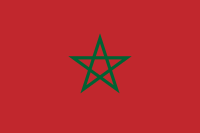
Photo from wikipedia
In 2001, a surprising theatrical event took place on the margins of the Israeli theatrical landscape. For the first time, an Arabic-language production that did not dealwith the Israel–Arab conflict… Click to show full abstract
In 2001, a surprising theatrical event took place on the margins of the Israeli theatrical landscape. For the first time, an Arabic-language production that did not dealwith the Israel–Arab conflict was performedby Jewish actors for a Jewish audience. A theatre troupe fromMigdal Ha’emek – in northern Israel – presented Molière’s The Miser, which was translated into and adapted to Judeo-Moroccan Arabic by Asher Cohen and directed by Ronit Ivgi. The creators and actors were Moroccan-born Jews or second-generation immigrants, fluent in Judeo-Moroccan as a mother tongue. An audience of Moroccan-descendant Jews and their offspring flocked to the performance in Migdal Ha’emek. From 2001 to 2011, about 50,000 spectators watched TheMiser; its success brought about a noticeable change in Israeli theatre, and about 25 Judeo-Moroccan-language productions followed it between 2001 and 2017. These Jewish-Moroccan productions of other plays, in turn, inaugurated a cultural shift, as about 15 productions in other languages were subsequently produced. These included Jewish-Iraqi theatre by Sigal Shaul and Kobi Pasha, Jewish-Bukhari theatre by the Davidov Brothers, Jewish-Kurdish-Aramaic theatre by Gila Khakimi, and Amharic theatre by the Ethiopian Jewish artist, Frot Prada. From the1950s to the 1970s, the state of Israel exerted substantial pressure to erase and marginalize Jewish languages and cultures in general, and those of Jews from Arab and Muslim countries in particular, as part of nationbuilding in order to create a uniform Israeli identity molded exclusively around Hebrew language and culture. From the 1980s, there has been a withdrawal fromthis radical andoppressive policywith the emergenceof nonHebrew Jewish theatre representing a clear newmanifestationof this trend. In this article, I specifically focus on Jewish-Moroccan theatre which has proved both pioneering and dominant in this field. As well as paving the way for theatres in other languages that have challenged aspects of Zionist ideology E-mail: [email protected]
Journal Title: Contemporary Theatre Review
Year Published: 2019
Link to full text (if available)
Share on Social Media: Sign Up to like & get
recommendations!